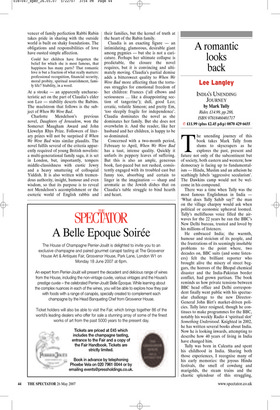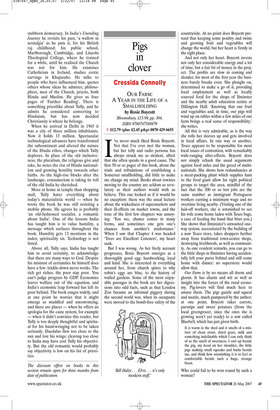A romantic looks back
Lee Langley
INDIA’S UNENDING JOURNEY by Mark Tully Rider, £14.99, pp.288, ISBN 97818460401717 ✆ £11.99 (plus £2.45 p&p) 0870 429 6655 The unending journey of this book takes Mark Tully from slums to skyscrapers as he explores the past, present and future not only of the subcontinent but of society, both eastern and western; how democracy is facing up to fundamentalism — Hindu, Muslim and an atheism he scathingly labels ‘aggressive secularism’. The Dawkins camp would not be welcome in his compound.
There was a time when Tully was the most famous Englishman in India — ‘What does Tully Sahib say?’ the man on the village charpoy would ask when political or economic upheaval loomed. Tully’s mellifluous voice filled the airwaves for the 22 years he ran the BBC’s New Delhi bureau, trusted and loved by his millions of listeners.
He embraced India; the warmth, humour and stoicism of its people, and the frustrations of its seemingly insoluble problems to the point where, two decades on, BBC suits (and some listeners) felt the brilliant reporter who brought alive the misery of street beggars, the horrors of the Bhopal chemical disaster and the India-Pakistan border conflict, had grown partisan. The book reminds us how private tensions between BBC head office and Delhi correspondent finally went public with his spectacular challenge to the new DirectorGeneral John Birt’s market-driven policies. Tully later resigned, though he continues to make programmes for the BBC, notably his weekly Radio 4 ‘spiritual slot’ Something Understood. Knighted in 2002, he has written several books about India. Now he is looking inwards, attempting to describe how 40 years of living in India have changed him.
Tully was born in Calcutta and spent his childhood in India. Sharing both those experiences, I recognise many of his early memories: the joyous Hindu festivals, the smell of cowdung and marigolds, the steam trains and the chaotic splendour of this struggling, stubborn democracy. In India’s Unending Journey he revisits his past, ‘a wallow in nostalgia’ as he puts it, for his British raj childhood; his public school, Marlborough; Cambridge, and Lincoln Theological College, where he trained for a while, until he realised the Church was not for him. He examines Catholicism in Ireland, studies erotic carvings in Khajuraho. He talks to people who have influenced him, quotes others whose ideas he admires; philosophers, men of the Church, priests, both Hindu and Muslim. He gives us four pages of ‘Further Reading’. There is something priestlike about Tully, and he admits he considered converting to Hinduism, but has now decided Christianity is where he belongs.
When he arrived in Delhi in 1965 it was a city of three million inhabitants. Now it holds 13 million. Spectacular technological advances have transformed the subcontinent and altered the nature of the Hindu ethos, changes which Tully deplores. In place of the old inclusiveness, the pluralism, the religious give and take, he notes the rise of Hindu nationalism and growing hostility towards other faiths. As the high-rise blocks alter the landscape, consumerism is taking its toll of the old India he cherished.
More at home in temple than shopping mall, Tully hates everything about today’s materialistic world — when he wrote the book he was still resisting a mobile phone. He agrees he is probably ‘an old-fashioned socialist, a romantic about India’. One of the lessons India has taught him is to value humility, a message which surfaces throughout the book. Humility gets 13 mentions in the index; spirituality six. Technology is not listed.
Above all, Tully says, India has taught him to avoid certainty, to acknowledge that there are many ways to God. Despite his mistrust of certainties he himself does have a few: trickle-down never works. The rich get richer, the poor stay poor. You can’t judge progress by GDP. Economics leaves welfare out of the equation, and India’s economic leap forward has left its poor behind. The book ranges widely, and at one point he worries that it might emerge as muddled and unconvincing, and there are places — when he offers an apologia for the caste system, for example — when it didn’t convince this reader, but Tully is too deeply thoughtful and spiritual for his hand-wringing not to be taken seriously. Daedalus flew too close to the sun and lost his wings; cleaving too close to India may have cost Tully his objectivity. But the old romantic would probably say objectivity is low on his list of priorities.
The discount offers on books in this section remain open for three months from date of publication.



















































































 Previous page
Previous page